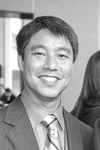
David Inoue
Last month, Japanese Finance and Deputy Prime Minister Taro Aso, known for frequently putting his foot in his mouth, stated that Japan was the only country that benefits from over 2,000 years of history under a single monarch and single ethnic group. Critics quickly pointed out the presence of Japan’s indigenous people, the Ainu, and that there are many Japanese of mixed ethnicity as well, particularly on the World Cup rugby team, which he was praising the success of in his broader remarks.
The topic of ethnic purity comes up often, even in our Japanese American community. JACL members have called, complaining that our current and one of our past presidents are Chinese.
I must admit that I take some satisfaction in informing these callers that I, too, am half-Chinese, and, in fact, my mother’s Chinese family name is Moy, the same surname as our current president, Jeffrey Moy.
The subject especially reared its head a few months ago in two successive articles in the Rafu Shimpo regarding MLB Washington Nationals catcher Kurt Suzuki’s visit to the White House, where he wore a MAGA hat.
In a response to the first article critical of Suzuki, another Japanese American questioned whether the first author was legitimately Japanese American because he didn’t look the part.
In the year 2020, I find it hard to believe we are still at this point. In fact, we are over 50 years removed from the Loving v. Virginia case, which finally stuck down anti-miscegenation laws.
In that case, JACL not only submitted an amicus brief, but also was granted the opportunity to participate in oral arguments. Among the arguments made by JACL lawyer Bill Marutani was that the very concept of racial purity was a false premise and should not be preserved in statute.
This was the position of the JACL then, and it remains our position today.
Identity is a challenging concept, one that especially confronted many Japanese Americans after World War II. It was our Japanese identity that resulted in our incarceration. Japanese tradition is that the nail that sticks up, gets pounded down. As a result, for many, the best response after the war was to fit in, lose our Japanese ways and be as “American” as possible.
Today, we participate in the Kakehashi program, which supports college students and young adults with a trip to Japan to potentially connect with their Japanese ancestry. And among the most popular events at JACL chapters and other Japanese American community groups are the cultural gatherings such as Obon or Mochitsuki.
I certainly do not want to discount the importance of cultural events, and they are important to JACL’s identity as a Japanese American organization. But what is key to JACL’s identity is the collective experience as a Japanese American community with racism before, during and after WWII incarceration.
Our story does not begin and end with the incarceration experience, but that is the unfortunate low point in a long history and continuing experience with racism in this country. It is the incarceration story that gives power to our advocacy for civil rights as when we say what happened to Japanese Americans should never again happen to another group, whether it be today’s Muslim Ban or immigrant families incarcerated at our border.
I hope what is clear is that for JACL, the concept of promoting a Japanese or Japanese American purity test would be antithetical to who we are. The foundation of JACL is a civil rights organization and that mission is what binds us together as a community.
The Japanese American component of our name centers around our story, not our culture or ancestry. Anyone can, and should, tell our story because it is a unique one — it’s an important American story.
To do that, one need not be full Japanese ancestry, or even any. It only requires a good heart and understanding of what is right and what is wrong, as well as the conviction to act on that understanding.
We also must confront racism within our own community. The majority of Japanese Americans now identify as multiracial or multiethnic. When Marutani argued before the Supreme Court in Loving v. Virginia, he noted that his own parents would object to him marrying a white woman.
If now for over 50 years, the courts felt Marutani should have the right to do so, and clearly most Japanese Americans have chosen to marry regardless of their spouse’s race or ethnicity, why are there still some in our community that continue to object?
David Inoue is executive director of the JACL. He is based at the organization’s Washington, D.C., office.



